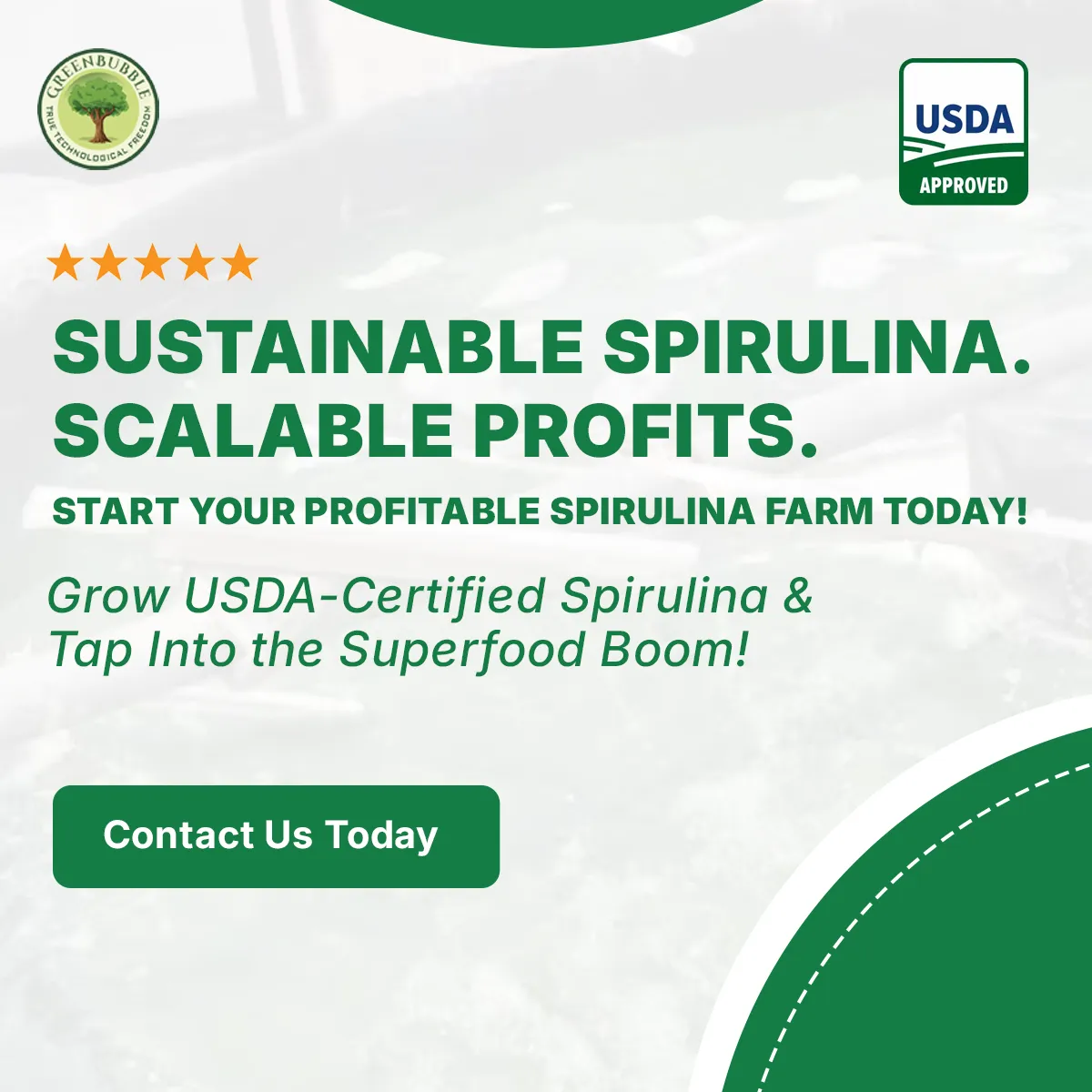A New-Age Opportunity Rooted in Ancient Nutrition
Imagine a crop that uses 90% less water than traditional farming, grows year-round, yields protein richer than soy, and fetches premium prices in wellness and nutraceutical markets.
That’s spirulina—a microscopic cyanobacterium with macroscopic potential.
As India shifts toward smart agriculture, plant-based nutrition, and sustainable exports, spirulina farming has quietly emerged as a high-return, low-footprint opportunity. Yet, it’s not just another “trendy” crop. It’s a scalable, science-backed, and market-validated business.
In this article, we break down the top five reasons why spirulina algae farming in India is not just viable—but visionary.
Let’s dive in.
1. India Offers Ideal Climatic Conditions for Spirulina Growth
Spirulina thrives in very specific conditions:
- Temperature: 30–35°C
- pH: 9–11 (alkaline water)
- Sunlight: 8–10 hours daily
Most Indian states—especially Maharashtra, Tamil Nadu, Karnataka, Telangana, Gujarat, and Rajasthan—offer these natural conditions almost year-round. Unlike leafy vegetables or cereals, spirulina is not dependent on monsoons or growing seasons. With proper water and nutrient management, it can grow 300+ days a year.
The result?
High productivity + low climate risk = consistent annual income.
Want to know what a full-scale farm looks like? Explore Large-Scale Spirulina Cultivation Techniques
2. The ROI is Real – High Value per Acre
Let’s talk numbers.
A well-planned 1-acre spirulina farm (IoT-enabled, HACCP-ready) costs around ₹75–95 lakhs to set up. While that may seem capital-heavy, here’s the kicker:
- Yield: 12–15 tons of dry spirulina/year
- Selling price: ₹600–₹900/kg (non-organic), ₹1500–₹2200/kg (certified organic)
- ROI timeline: ~2–3 years
- Shelf-stable product (up to 2 years when dried properly)
Unlike vegetables or pulses, spirulina doesn’t perish in 7 days or depend on mandi rates. With proper batch traceability and COA-backed production, spirulina can command premium prices in both domestic nutraceutical markets and international exports.
Even smaller rooftop or pilot farms (500–1000 sq. ft.) can generate high-margin boutique products like spirulina capsules, skincare blends, and functional powders.
Want to understand cost factors? Read Spirulina Farming Costs and Profits
3. Spirulina is a Sustainable, Climate-Resilient Crop
India is entering an era of climate-uncertain agriculture. Water tables are falling. Soil degradation is rising. Meanwhile, demand for plant-based protein is booming.
Enter spirulina—a crop that:
- Requires minimal land
- Uses 90% less water than traditional crops
- Doesn’t need soil (grown in tanks)
- Doesn’t demand chemical fertilizers or pesticides
- Fixes carbon while producing oxygen
With global pressure to decarbonize food systems, spirulina checks all the boxes of a regenerative, circular, low-emission farming model.
Moreover, spirulina fits into India’s Smart Farming narrative. With IoT-based sensors, automated agitators, and SCADA systems, farms can be managed with low labor and high consistency.
Curious how automation plays a role? Explore Automation in Spirulina Farming
4. Market Demand Is Booming – Domestically and Globally
Let’s look at real demand.
- Wellness & Fitness: Spirulina powders, capsules, energy bars
- Cosmetics: Anti-aging, detox, and anti-acne formulations
- Pharma: Liver health, immunity boosters, and anemia support
- Animal Feed: Poultry, fish, and pet nutrition enhancer
In India, the rise of D2C health brands, gym and vegan consumers, and clean-label supplements is opening massive B2B opportunities for bulk spirulina supply. Internationally, the EU and US markets are importing certified spirulina at 3–5x Indian pricing.
Key buyers include:
- Nutraceutical companies
- Organic supplement brands
- Wellness resorts and spas
- Contract manufacturers (nutraceutical OEMs)
And the best part? You don’t need to be a multinational. Even small farms with a COA and clean process can access B2B buyers or launch D2C health products.
➡️ Get insights into demand drivers in Market Trends and Opportunities
5. Government Support Is Growing
The Indian government is pushing nutraceuticals, aquaculture, and clean farming—all of which spirulina aligns with. While there’s no one-size-fits-all subsidy, multiple schemes apply, including:
- PMFME: For micro food processing enterprises
- Aquaculture Grants: For water-based protein farming
- Mudra Loans: For collateral-free setup capital
- Startup India/Bioenergy Schemes: For innovative, tech-enabled spirulina models
Several state-level agriculture departments are also recognizing spirulina under non-traditional crops and offering solar pump subsidies, training support, and inclusion in FPO product baskets.
What’s more, spirulina qualifies under agricultural business models with global potential, giving it access to new-gen startup incentives and sustainability grants.
➡️ Want to know where and how to apply? Read Government Grants and Subsidies for Spirulina Farming
Bonus: Spirulina Is Beginner-Friendly—With the Right Support
Unlike traditional crops that take months, spirulina farming allows:
- Faster feedback cycles
- Controlled experiments (small tanks to start)
- Simple lab setup for inoculation and culture monitoring
- Clear quality markers (color, pH, growth rate, protein %)
Beginners can start with a pilot tank, learn the ecosystem, and scale up within 6–12 months. With the right consultation and turnkey setup, many farms are operational within 90 days.
That said, skipping quality control or trying to cut corners can lead to contamination, rejected batches, and reputational damage.
Want to avoid beginner mistakes? Explore Challenges and Solutions in Scaling Spirulina Farming
Final Thoughts – Is Spirulina Farming Right for You?
If you’re:
- Passionate about health, nutrition, and sustainability
- Seeking a scalable, high-margin agri-business
- Willing to invest in quality, compliance, and automation
- Ready to cater to India’s and the world’s clean protein demand
Then spirulina farming in India is your green gold opportunity.
It’s not about chasing trends. It’s about building a future-proof farm aligned with where the world is going: plant-based, low-footprint, high-impact agriculture.
👉 Start Your Spirulina Journey with Greenbubble
At Greenbubble, we specialize in designing, building, and scaling spirulina farms tailored to your vision—whether you’re a first-time farmer or an established agri-entrepreneur.
From site selection, tank design, and lab setup to automation, drying systems, organic certification, and buyer access—we’ve got you covered.
Let’s help you turn your land into a thriving spirulina ecosystem.
👉 Get in touch today to book a consultation and download our starter blueprint.


